Geftine Pty Ltd v Dover Beach Pty Ltd
Geftine Pty Ltd v Dover Beach Pty Ltd
Geftine Pty Ltd v Dover Beach Pty Ltd
You also want an ePaper? Increase the reach of your titles
YUMPU automatically turns print PDFs into web optimized ePapers that Google loves.
,VICTORIAN CIVIL AND ADMINISTRATIVE TRIBUNALCIVIL DIVISIONDOMESTIC BUILDING LIST VCAT REFERENCE NO. D584/2004CATCHWORDSCosts – Successful s.112 VCAT offer of compromise – “All costs” order – Meaning –Indemnity costs.APPLICANT:RESPONDENTS:WHERE HELD:BEFORE:<strong>Geftine</strong> <strong>Pty</strong> <strong>Ltd</strong><strong>Dover</strong> <strong>Beach</strong> <strong>Pty</strong> <strong>Ltd</strong> (T/as Stone Constructions)& OrsMelbourneHis Honour Judge DoveDATE OF HEARING: 19 October 2006DATE OF REASONS: 30 October 2006GEFTINE PL V DOVER BEACH PL (DOMESTIC BUILDING) [2006] VCAT 2189ORDERS1. That the respondents pay damages to the applicant in the sum of $29,950.00,including $4,000.00 damages in the nature of interest. (Order made on 4 thOctober 2006).2. That the respondents pay the applicant’s costs, to be taxed on County CourtScale “C”, on a party and party basis, from the commencement of theproceeding to the 23 rd December 2004.3. That the respondents pay the applicant’s costs, to be taxed on County CourtScale “C”, on an indemnity basis, from the 23 rd December 2004 onwards.4. With certificates for counsel based on the fees payable pursuant to CountyCourt Scale “C” with such refreshers as the taxing officer allows and thereasonable costs of the preparation of the Tribunal book.5. That there be a stay for the payment of costs for 30 days.HIS HONOUR JUDGE DOVEAPPEARANCES:For the Applicant:For the Respondents:Mr P Baker of Counsel, instructed by RigbyCooke LawyersMr G Hellyer of Counsel, instructed by Hoeys,
Lawyers
REASONS FOR DECISION – COSTS APPLICATION1 In delivering my reasons in this matter, I awarded the applicant damages inthe sum of $29,950.00 (including $4,000.00) damages in the nature ofinterest. I dismissed the counterclaim of the first and third respondents (“therespondents”). For completeness, I point out that the applicant had releasedthe second respondent from the proceeding prior to the hearing. The disputerelated to the construction by the respondents of a residence abovecommercial premises owned by the applicant.2 The proceeding came before me again on 19 th October, 2006, to enable theparties to make submissions concerning costs.3 The applicant sought an order for costs upon an indemnity basis from 23 rdDecember, 2004, against the respondents or, in the alternative, that therespondents pay the applicant’s costs on County Court Scale “C” as upon aparty/party basis.4 The question of what costs orders should be made requires, in the presentcase, consideration of two sections of the Victorian Civil and AdministrativeTribunal Act 1998 (“the VCAT Act”). Section 109 of the VCAT Act providesthe general basis for determination of costs issues. By s.s.(1), the generalprovision, and legislative preference, is that each party bear his or its owncosts of any proceeding brought under the Act. However, later provisions inthe section give the Tribunal a discretion, which is broadly based, to awardcosts in favour of one party against another.5 The second section of relevance in this proceeding is s.112, a section whichpermits a party to make a formal settlement offer, which if more favourable tothe other party than the outcome of the proceeding, creates a presumption ofan order for costs in favour of the party making the offer.6 Section 109 is as follows:-D584/2004<strong>Geftine</strong> <strong>Pty</strong> <strong>Ltd</strong> v <strong>Dover</strong> <strong>Beach</strong> <strong>Pty</strong> <strong>Ltd</strong> (T/as StoneConstructions) & Ors2
“112. Presumption of order for costs if settlement offer is rejected(1) This section applies if—(a)(b)(c)(d)a party to a proceeding (other than a proceeding for review of adecision) gives another party an offer in writing to settle theproceeding; andthe other party does not accept the offer within the time the offeris open; andthe offer complies with sections 113 and 114; andin the opinion of the Tribunal, the orders made by the Tribunalin the proceeding are not more favourable to the other party thanthe offer.(2) If this section applies and unless the Tribunal orders otherwise, aparty who made an offer referred to in sub-section (1)(a) is entitledto an order that the party who did not accept the offer pay all costsincurred by the offering party after the offer was made.(3) In determining whether its orders are or are not more favourable to aparty than an offer, the Tribunal—(a)(b)must take into account any costs it would have ordered on thedate the offer was made; andmust disregard any interest or costs it ordered in respect of anyperiod after the date the offer was received.”9 Mr Baker relied upon a document entitled “Offer of Settlement by theApplicant” dated 23 December, 2004.Mr Hellyer, counsel for therespondents, conceded the document had been served on the respondents’solicitors on or about that date. In conformity with one of the requirements ofs.114 of the VCAT Act, the time given for acceptance of the offer wasexpressed to be 21 days.10 The document was in these terms (formal parts omitted):-“TAKE NOTICE1. This is an Offer of Compromise served in accordance with Part 4, Division 8 ofthe Victorian Civil and Administrative Tribunal Act 1998.2. The Applicant offers to compromise its claims against the First & ThirdRespondents and the First & Third Respondents’ counterclaim on the termsthat follow.3. The Applicant pay to the First & Third Respondents the sum of $25,000 (“thesettlement sum”).4. The Applicant shall pay to the First & Third Respondents such costs, if any, asmay be agreed between these parties or, in default of agreement, as may befixed by the Tribunal (“the costs”).5. The costs, if any, shall be paid to the First & Third Respondents within 14 daysD584/2004<strong>Geftine</strong> <strong>Pty</strong> <strong>Ltd</strong> v <strong>Dover</strong> <strong>Beach</strong> <strong>Pty</strong> <strong>Ltd</strong> (T/as StoneConstructions) & Ors4
of being agreed or fixed, as the case may be.6. The Applicant shall pay the settlement sum to the lawyer for the First & ThirdRespondents within 28 days of the Respondents’ acceptance of this Offer ofCompromise.7. Subject to the First & Third Respondents accepting the offer set out inparagraphs 1 to 6 hereof, the Applicant offers to settle its claims against theSecond Respondent on the basis that the Applicant withdraws or discontinuesits claims against the Second Respondent, and thereupon the SecondRespondent shall pay all its own costs of and incidental to these proceedings.7. (sic) Forthwith upon the acceptance of this Offer of Compromise by allRespondents the parties shall do all things and sign all documents to have allmatters between all parties hereto arising out of or incidental to theseproceedings struck out without adjudication on the merits and with no order asto costs.8. This Offer of Compromise is made without prejudice.9. This Offer of Compromise is open for acceptance for a period of 21 days afterthe day on which it is served.10. This offer is made without prejudice to the right of the Applicant to submit tothe Tribunal that the Respondents are not entitled to any costs in this matter.”11 In the result, the applicant achieved a far more favourable result than thatmade in the offer, and that was not disputed. However, the respondentsattacked the offer on two bases. First, that the offer was ambiguous anduncertain in its terms. Secondly, that it was unfair to give the respondentsonly 21 days to consider the offer when a significant part of that period wasabsorbed by the Christmas-New Year holiday period.12 The first proposition that the offer was uncertain and ambiguous is basedupon what is recited in paragraphs 4 and 10 of the offer, which paragraphsrelate to costs. Those paragraphs are set out above.13 The first of these submissions is not without its attraction. It is clear that theapplicant was reserving the right to argue, in the event that its offer wasaccepted by the respondents, that the general provisions of s.109 shouldapply and that no order for costs should be made. If s.109 applied, apresumption arose that no costs should be ordered to be paid. As s.112does not contain any provision concerning costs in relation to acceptance ofan offer of compromise, the Tribunal would be left to determine theentitlement to costs pursuant to the provisions of s.109. This regime standsD584/2004<strong>Geftine</strong> <strong>Pty</strong> <strong>Ltd</strong> v <strong>Dover</strong> <strong>Beach</strong> <strong>Pty</strong> <strong>Ltd</strong> (T/as StoneConstructions) & Ors5
in contrast to the relevant provisions of O.26 Supreme Court Rules. O.26.03sets out the steps relating to the making of an offer of compromise and to itsacceptance. O.26.03(7) is in these terms:-“7. Upon the acceptance of an offer of compromise in accordance withparagraph (4), unless the Court otherwise orders, the defendant shall paythe costs of the plaintiff in respect of the claim up to and including the daythe offer was served.”14 Thus, it is argued that, under the Rules, the presumption is that a partyaccepting an offer will recover its costs. The authorities recite that it will failto do so only in exceptional circumstances. Further, an offer of compromisegiven under the Rules relates to the claim(s) only; by reason of the sub-ruleto which reference has been made above, the Rules take care of costs. Theabsence of a costs provision in s.112 (or in s.113 to 115) creates for theparty receiving the offer the dilemma that it is uncertain whether it will receiveits costs, as the Tribunal would be required to consider that question in thelight of s.109. It is said that faced with that uncertainty, the Tribunal shouldnot give effect to this offer.15 Despite the attractiveness of this argument, I do not find it to be valid. Thedifficulty said to be present in the respondents’ minds relates not to thecontent of the offer, but to the failure of the Parliament to insert into s.112 asub-section similar to O.26.03(7). As s.112 and the following sections, 113to 115, are silent on the question of costs, the applicant applied its mind togiving clarity to its offer. It did that by the introduction of paragraphs 4 and10.16 The respondents objected that the offer was not clear and precise, referringin support of that contention to the passage in Williams – Civil ProcedureVictoria @ [1.26.02.30]. I reject that submission. My conclusion overall isthat the applicant’s offer was as clear and precise as the section allowed.17 It offered $25,000.00 and further offered to pay the respondents’ costs, if theD584/2004<strong>Geftine</strong> <strong>Pty</strong> <strong>Ltd</strong> v <strong>Dover</strong> <strong>Beach</strong> <strong>Pty</strong> <strong>Ltd</strong> (T/as StoneConstructions) & Ors6
Tribunal so ordered. In doing so it was echoing the spirit of O.26, byagreeing to pay costs if the Tribunal so ordered. Any complaint of lack ofclarity or precision might properly be directed at the drafting of s.112. I amsatisfied that the applicant’s offer was one given validly in conformity withs.112. It was not objected that the offer failed to comply with s.113 and 114(see s.112(1)(c)) and I am satisfied that it does. The orders I have indicatedI shall make in relation to principal relief show clearly that they are morefavourable to the applicant than the offer made by it on the 23 rd December,2004.18 I turn then to the second submission of the respondents; namely that thegiving of the offer immediately before the Christmas break gave therespondents too little time for appropriate consideration, even though 21days for acceptance was given. Although it was not spelt out, I assume itwas being contended that, as the Supreme Court Rules state that time fixedby those Rules shall not run between 24 December and 9 January, thosedays should be excluded from consideration when calculating the minimumperiod of 14 days during which the offer shall remain open as required bys.114(2). There are two immediate answers to that submission. First,neither the VCAT Act nor the Rules make any provision for a period duringwhich time shall not run. Secondly, the concept of a summer vacation doesnot exist at VCAT, where the Tribunal resumes sitting in early January. Thegiving of 21 days was a sensible act having regard to the onset of Christmasbut it was not necessary. I reject the submission.19 Accordingly, I conclude that the applicant is entitled to an order that therespondents pay all costs from that last date, unless I am persuaded tootherwise order. To this I shall return.20 As s.112 does not deal with the question of costs prior to the date of theoffer, it is necessary to determine what order should be made in relation toD584/2004<strong>Geftine</strong> <strong>Pty</strong> <strong>Ltd</strong> v <strong>Dover</strong> <strong>Beach</strong> <strong>Pty</strong> <strong>Ltd</strong> (T/as StoneConstructions) & Ors7
proceeding to the 23 rd December, 2004.24 I return then to the costs order I should make for the period from 23 rdDecember 2004. I have determined that the offer was one given properly incompliance with s.112 to 115. This creates a presumption in favour of theapplicant concerning costs. I have endeavoured to give expression to thesubmission that I should otherwise order and I have rejected thatsubmission. It follows, and I conclude, that the applicant should recover allcosts from the 23 rd December, 2004. The term “all costs” is an unusual term.In the legislation and the Rules, costs have traditionally been identified as“Party-Party Costs”, “Solicitor and Client Costs”, and “Costs on an IndemnityBasis” (see O.63.28). The amplitude of each such expression is explained inO.63.29 to 31.25 Because the term “all costs” is not defined, debate has ensued aboutwhether it should be interpreted as meaning solicitor client costs or indemnitycosts. In Duggan v MGS Products <strong>Pty</strong> <strong>Ltd</strong> [2002] VCAT 1764, DeputyPresident Macnamara said that as there were no words of qualification of “allcosts” the term meant that the party was entitled to a full indemnity and thatcosts on a full indemnity basis should be awarded. I agree that the plainmeaning of the words is such that an order for costs on a full indemnity basisshould be given in the present case.26 The distinction between solicitor-client costs and indemnity costs is to beseen in comparison of the wording of O.63.30 with that in O.63.31. Themajor practical difference appears to lie in the shifting of the onus, the effectof which may be significant in some cases, but not in others.27 In the present case, there is a need for a limitation in one respect. If thisaction had been able to have been brought in the County Court, thedamages awarded barely propelled it into Costs Scale “C”. I propose toorder that costs be taxed on Scale “C” and to restrict any certificates I give toD584/20049<strong>Geftine</strong> <strong>Pty</strong> <strong>Ltd</strong> v <strong>Dover</strong> <strong>Beach</strong> <strong>Pty</strong> <strong>Ltd</strong> (T/as StoneConstructions) & Ors
that Scale. It was a small claim on any view. The applicant pursued certainclaims for rectification which were trivial and other claims which failed. Ineach case time was expended in pursuing them. To the extent that I limitindemnity costs to Scale “C”, I otherwise order as provided for in s.112(2).28 This is not a case where justice is done by allowing, for example, fees tocounsel based on County Court Scale “D”, or on the going Supreme Courtrate. Likewise, the Registrar or other taxing officer will have to considerwhether, in the context of my comments, it is unreasonable to allowexpenses to experts which are in excess of the sums set down in the CostsSchedule.29 In the result, I propose to make the following costs orders:1. That the respondents pay the applicant’s costs, to be taxed on CountyCourt Scale “C”, on a party and party basis, from the commencementof the proceeding to the 23 rd December, 2004.2. That the respondents pay the applicant’s costs, to be taxed on CountyCourt Scale “C”, on an indemnity basis, from the 23 rd December 2004onwards, with certificates for [ ].3. I shall hear counsel concerning certification.HIS HONOUR JUDGE DOVED584/2004<strong>Geftine</strong> <strong>Pty</strong> <strong>Ltd</strong> v <strong>Dover</strong> <strong>Beach</strong> <strong>Pty</strong> <strong>Ltd</strong> (T/as StoneConstructions) & Ors10


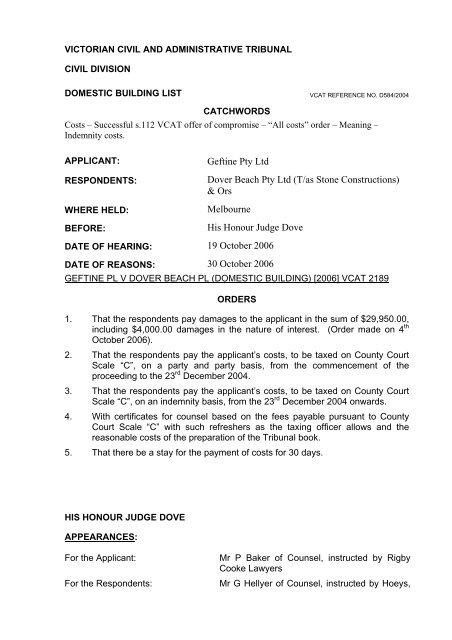
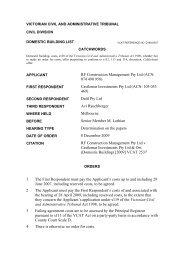
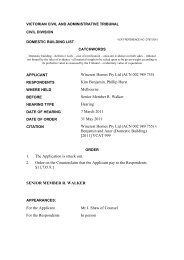
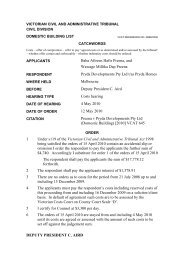
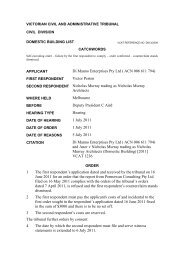
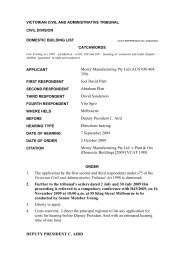
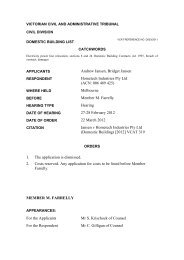
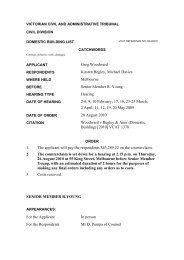
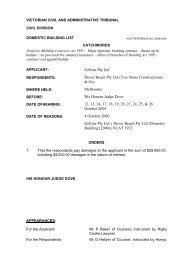
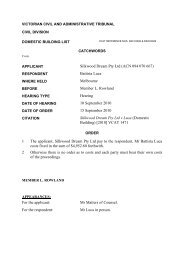
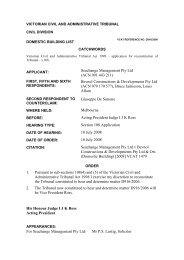
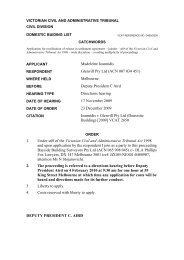
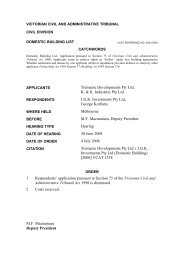
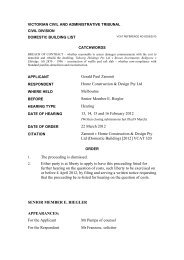
![Avonwood Homes v Milodanovic (Domestic Building) [2005]](https://img.yumpu.com/46781998/1/184x260/avonwood-homes-v-milodanovic-domestic-building-2005.jpg?quality=85)